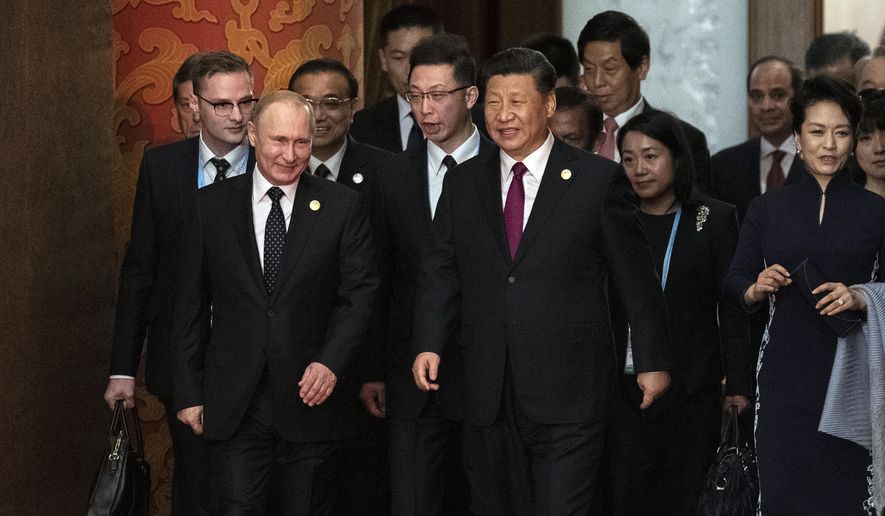The Commerce Department this week sanctioned 23 Chinese companies, including five linked to arms sales to Russia since Moscow’s invasion of Ukraine in February.
Two other Chinese firms already on the department’s export blacklist also provided military goods to Moscow, the department said in a statement.
In addition to the five Chinese firms, one company in Uzbekistan was identified as supplying military goods to the Russian military since February. It was the first time the U.S. government identified Chinese companies involved in supporting the Russian military.
China has refused to condemn Russia’s invasion and the state-controlled press says that the U.S. and NATO are to blame for provoking the war. Chinese firms have a mixed record of observing international sanctions placed on Moscow since the fighting began.
“The six entities are subject to severe restrictions on access to U.S. technologies and items for having contracted to continue to supply Russian military end users since February 24, 2022, when the current restrictions were put in place,” the department said in a statement Tuesday.
The Chinese companies were added to the department’s blacklist known as the “entities list” of designated firms that are denied access to U.S. goods and services.
The department also disclosed that two Chinese companies already on the blacklist since 2018 have maintained their support of the Russian military even after the Ukraine-related sanctions took effect. The two firms, China Electronics Technology Group Corporation 13th Research Institute and a subsidiary, Micro Electronic Technology in China, previously were sanctioned for military-related transfers to Russia.
Sanctions on the Russian military were imposed after the Feb. 24 invasion by the United States and 37 other allied nations.
Commerce officials declined to provide specifics of the military goods sent to Russia from China. However, the new sanctions confirm suspicions that Beijing’s announced policy of neutrality toward Russia’s war in Ukraine is far from absolute.
Adm. John Aquilino, commander of the Indo-Pacific Command, said in remarks this week that growing China-Russia military collaboration under a February agreement signed just weeks before the Ukraine campaign began puts the West “in an extremely dangerous time and place in the history of humanity.”
Chinese President Xi Jinping told Russian President Vladimir Putin in a phone call earlier this month that “China stands ready to promote the stable and long-term development of pragmatic bilateral cooperation with Russia,” according to the Chinese Foreign Ministry readout.
Mr. Xi reportedly said during the call that Beijing “stands ready to continue mutual support with Russia on issues concerning core interests and major concerns, such as sovereignty and security, and to deepen strategic coordination between the two countries.”
China also has been supporting the Russian war effort through large-scale purchases of discounted oil as Western buyers draw back. Beijing has overtaken Germany as the largest single buyer of Russian energy resources, Radio Free Europe reported this week.
China and India together purchased an estimated 2.4 million barrels of Russian crude oil per day in May.
Asked about the latest Commerce sanctions, a Chinese Embassy spokesperson denied Chinese companies were backing the Russian military.
“China’s position on the Ukrainian issue is consistent and clear. We have been playing a constructive role in promoting peace talks and have not provided military assistance to the conflicting parties,” the spokesperson said.
In Beijing, Foreign Ministry spokesperson Zhao Lijian said the sanctions on Chinese companies have “no basis in international law” and he noted that the government has protested the action.
“China and Russia conduct normal economic and trade cooperation on the basis of mutual respect, equality and mutual benefit,” Mr. Zhao said. “This should not become the target of any intervention or restriction by a third party. In handling its relations with Russia, the U.S. must in no way undermine China’s legitimate rights and interests.”
The five Chinese companies placed on the entities list are Connec Electronic Ltd., King Pai Technology Co., Sinno Electronics Co., Winninc Electronic and World Jetta (H.K.) Logistics Ltd. The Uzbek company was identified as Promcomplektlogistic Private Company.
Additionally, 12 other Chinese companies were sanctioned for supplying or attempting to supply Iran with U.S.-origin electronics for the Iranian military.
Eight additional Chinese companies were blacklisted for covertly attempting to acquire unspecified U.S.-origin goods with military applications.
The addition of the companies to the blacklist is designed to prevent the evasion of sanctions on Russia and increase the economic pressure on Mr. Putin to pull back. Companies on the list must first seek an export license from the Commerce Department. Those on the entities list are presumed for license denial.
Undersecretary of Commerce for Industry and Security Alan Estevez said the action “sends a powerful message to entities and individuals across the globe that if they seek to support Russia, the United States will cut them off as well.”
Matthew S. Axelrod, the department’s assistant secretary for export enforcement, said, “Our rules are clear, and we will not hesitate to take action when parties backfill in violation of them.”
• Bill Gertz can be reached at bgertz@washingtontimes.com.




Please read our comment policy before commenting.